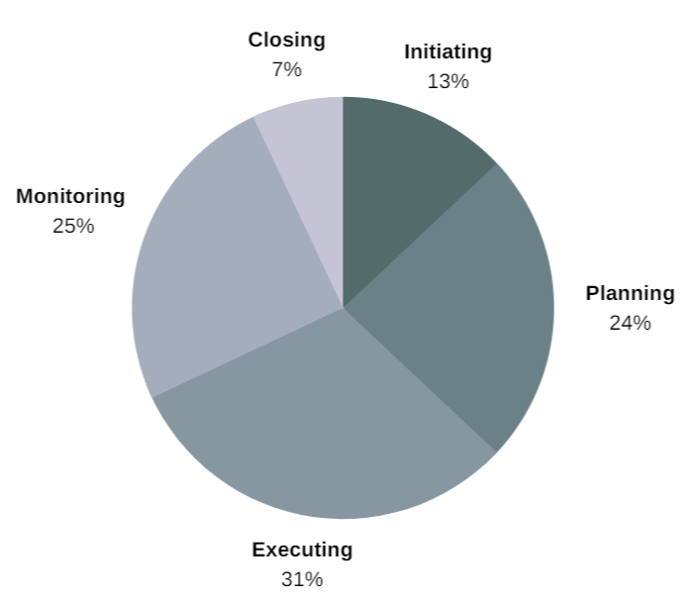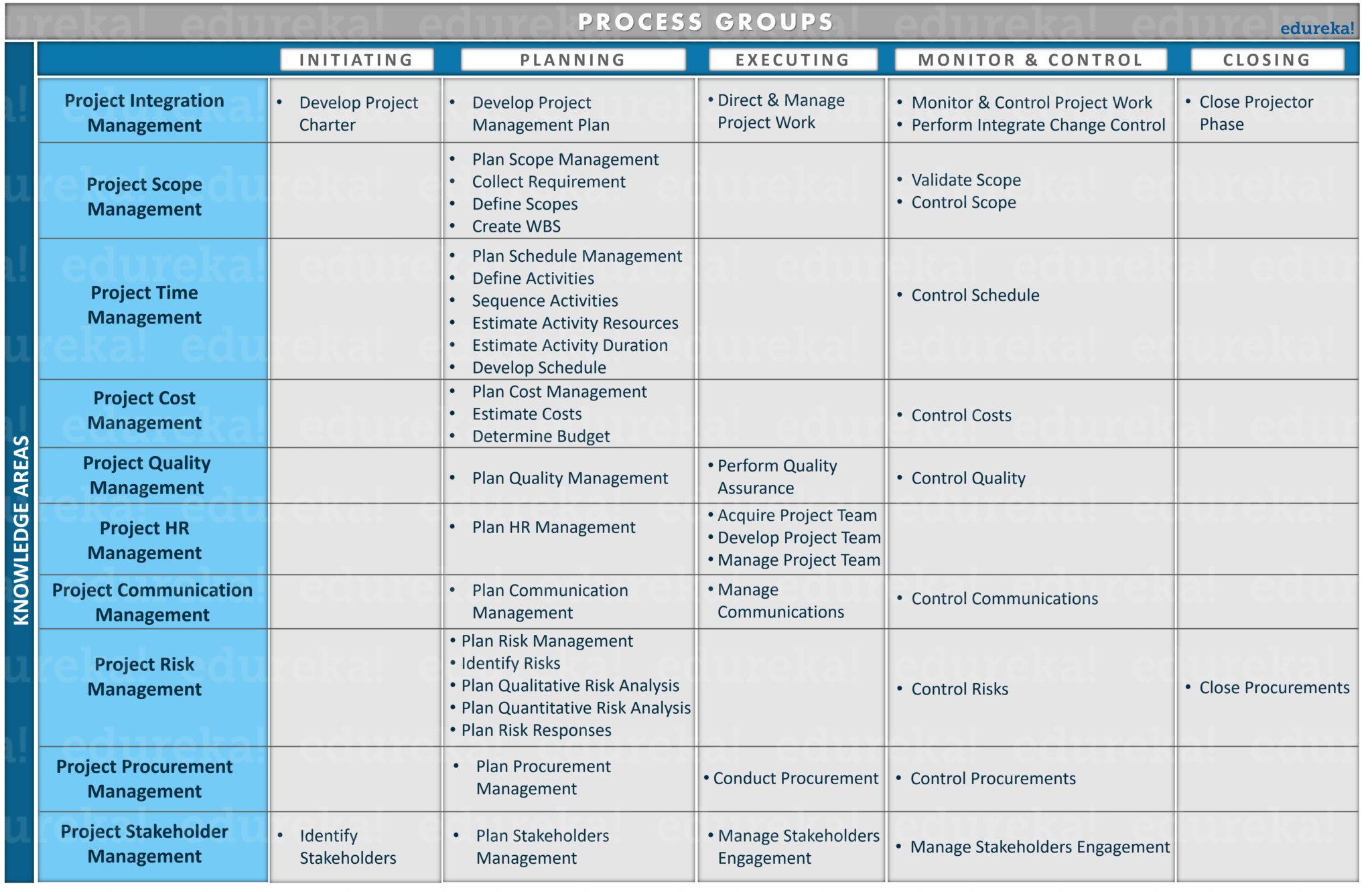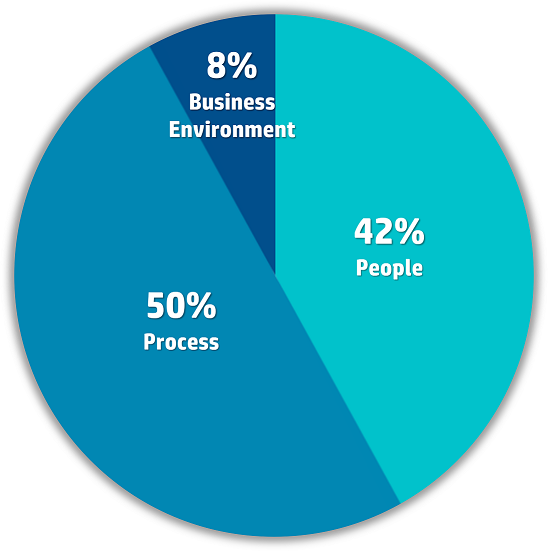PMP Certification Training
- 86k Enrolled Learners
- Weekend/Weekday
- Live Class
Are you planning to get PMP Certified to give your career a major push? If so, then are you confused about how to maintain a balance between your work and personal life while preparing for the exam? Well, if you are, you have landed to the right place. In this PMP® Exam Prep blog, I will be talking about all the hooks and crooks you need to conquer the PMP® Exam successfully.
Before I start off with the PMP® exam prep process, let me just outline of the total time you need to prepare for this exam. This will give you an idea of the time bracket you need to clear the exam in the first attempt.
Well, to be honest, PMP® exam preparation is not like “One size fits all”. What I mean is, it will all depend on the time and effort you put into it along with the dedication. So, after a long term of research and observation, it was concluded that it takes approx 6-8 weeks of time for a working professional to prepare for the exam. Below is the diagrammatic representation of the estimated timeline for the PMP exam preparation.
Let me elaborate on this timeline for you.
Before you apply for the PMP® exam, it is advised to take up a training course. These training courses are excellent for helping you understand the various parameters and requirements of different types of projects. Along with this, many of them will also help you in gaining the required number of PDUs (Professional Development Units) that are mandatory for the exam.
If you are looking for a structured training approach, there are quite a few reputed organizations that provide online training. One of them is Edureka. It is one of the fastest-growing online training providers with the most effective learning system in the world. Here, you will be guided by PMP® Certified Trainers who have years of experience in training.
These online courses are generally 4 weeks long and will help you in gaining a stronghold on Project management fundamentals. While undergoing the training, you can apply for the PMP® exam application form. You can generate your PMI credentials on pmi.org. I would recommend you to go for the offline mode of form fillup. This way, you will have enough time to pay attention to every section of the application before submitting it. Once your application is approved, the next step is scheduling the exam. It will be wise to schedule the exam after 6-8 weeks. This will give you enough time to study various process groups, Knowledge Areas, processes involved, etc. Also, you can take up various full mock exams to enhance your speed and boost your confidence. I think after going through all of this, you can easily clear the exam at the first attempt itself.
Related Learning: Know about the PMP certification salary in detail.
Before I switch to the next topic, let me make one thing very clear. PMP Certification is nothing like any other professional certification, which will be valid for a lifetime. Rather, it’s more like a journey of professional project management, where you reach the first milestone by clearing the exam and receiving the PMP® certificate. The next milestone will be redeeming the certificate after every three-year.
I think, if you can follow the above schedule, you can definitely bag the PMP® certificate at the first attempt itself.
Now, let’s move on to the next topic of this PMP® exam prep blog.
Top 7 PMP Exam Preparation Tips & Tricks
Let me start with the first tip:
It will help you in earning the required number of PDU’s mandatory for the PMP® Exam. Moreover, you will be able to achieve the PMP® certification with total efficiency by combining quality with your needs.
Being a working professional it becomes a tough task to study along with your job. Thus, you need to stay dedicated and squeeze out time to study as much as possible and try to avoid any kind of distractions.
To prepare better you must build up a schedule with all the subjects that you need to study. If possible, try and cover two different subjects per day. Along with studying, take notes and ask queries. Try to be punctual to your schedule but remember not to overdo it.
You can make use of forums/ groups on Facebook, Twitter, or LinkedIn to connect with other PMP® exam aspirants. Interacting with people will help you to find out what is happening and stay updated with the latest news regarding PMP® exam. Also, you can check out the latest blogs on PMP® written by certified people.
As I have already mentioned, try to appear for as many simulators as you can. It will help you to train your brain for quick processing even under pressure. Take notes after each simulator to have a clear idea of the areas you need to improve.
Check out the common certification questions and answers asked in previous PMP® exams. Read through all the questions and answers while attempting the simulators. Also, try to gain a thorough knowledge of a subject, it will increase your chances of finding the right alternatives.
Finally, I would suggest you to consider this PMP® Exam prep as a project. Set your deadline and stick to your schedule. It will give you more time to practice all the concepts that you have learned and organized in your study plan.
Find out our PMP Training in Top Cities/Countries
| India | Other Cities/Countries |
| Bangalore | UK |
| Hyderabad | US |
| Pune | Canada |
| Chennai | Australia |
| Mumbai | Singapore |
| Kolkata | Saudi Arabia |

Since you already know the estimated time you have, let me now discuss the exam syllabus and the areas you need to focus on.
The syllabus for PMP® exam is based on the PMBOK (Project Management Body Of Knowledge)® Guide. The latest edition of PMBOK® Guide was released in March 2018 i.e., the 6th Edition. According to the PMBOK® Guide, the PMP® exam syllabus is built around various process groups and knowledge areas. The below diagram shows the breakdown of the syllabus:
As you can see from the diagram, the Planning, Executing and Monitoring phases together covers more than 80% of the syllabus.
These phases are further categorized into various tasks/processes mapped into various Knowledge Areas. The following table represents the exact mapping of processes:

I hope by now you have a fair idea, about how extensive this syllabus is and why it is suggested to take up a training program. But one thing you must note here is that this exam pattern will remain valid until June 2020. In the next section of this article, I will brief you on what is changing in the PMP exam.’
Related Learning: Learn more about the PMP certification requirements here.
From 1st July 2020 onwards, the pattern of PMP examinations has changed. The new PMP exam syllabus will be based on three domains which are namely:

Project management practitioners need to work in a variety of project environments while making use of various approaches. But the current exam pattern is not able to incorporate all these. This is the major reason why PMI® has decided to update the exam pattern to make it capable of reflecting and combining various approaches across the value delivery spectrum. According to the new PMP examination pattern, 50% of the exam syllabus will cover the predictive project management approaches while the rest 50% will cover Agile or Hybrid approaches. Thus, we can conclude that the three approaches, predictive, agile, and hybrid, will be represented throughout the three domains mentioned above without isolating any particular domain or task.
But if you think that the PMP examination will become easier with fewer domains, then you are utterly wrong! According to the official statements released by PMI®, the PMP exam will become even harder to crack.
If you are wondering where you can acquire the required PDUs or Contact Hours, you can go ahead and check out Edureka’s Reasons to Get PMP Certified.
Now that you know what you need to prepare, let’s see how to optimize this process and maximize the output with minimum effort.
Do you know why people fail to pass this exam on their first attempt despite having years of experience in project management? Well, its because they assume that their experience will serve the same purpose as studying the PMBOK® Guide; which is a wrong notion. So, stay away from such false assumptions and instead meticulously study the entire PMBOK® Guide. It is the best source of learning and identifying the fundamental aspects of project management like ITTO (Inputs, Tools, Techniques & Outputs). Now how to optimize your time? Since you have a limited number of days, you have to make most out of them. Below I have created a 30-day schedule, in which you can thoroughly finish your PMP® exam prep:
| Domain | Syllabus Percentage | Estimated Time Required |
| Initiating | 13% | 4 days |
| Planning | 24% | 7 days |
| Executing | 21% | 9 days |
| Monitor & Control | 25% | 8 days |
| Closing | 7% | 2 days |
Once you have completed the PMBOK Guide, you will still have 2-3 weeks left for your exam. During this phase, it is strongly recommended that you take repeated mock tests. Unless and until you start consistently scoring 80% of marks, I won’t suggest you appear for the exam.
This brings us to the end of this blog on the PMP® exam prep. I hope this gave you a better picture of the journey you are going to embark on. One thing I would like to mention here is that passing the PMP® exam solely depends on your determination and the hard work you put into it. So, if you are preparing for this exam, make up your mind and put your heart and soul into it, and success will follow. I wish you all the best for your exam and happy learning.
Do you have a question for us? Please mention it in the comments section, and we will respond to you.
 Thank you for registering Join Edureka Meetup community for 100+ Free Webinars each month JOIN MEETUP GROUP
Thank you for registering Join Edureka Meetup community for 100+ Free Webinars each month JOIN MEETUP GROUPedureka.co
I really enjoyed this post. You describe this topic very well. I really enjoy reading your blog and I will definitely bookmark it! Keep up the interesting posts! Preparation For PMP Exam